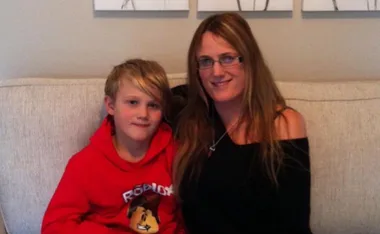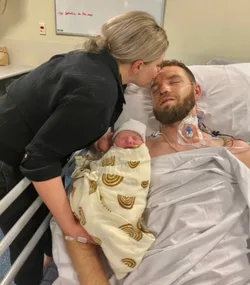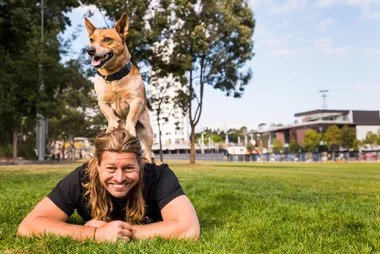Selected as the Great Read in the March issue of The Australian Women’s Weekly.
Prologue
August 1986
People didn’t have babies on aeroplanes. They just didn’t.
Well – well, actually they did. And then it was all over the newspapers.
‘Gallant aircrew deliver bouncing boy,’ it said, or words to that effect, and then went on to describe the mother of the bouncing boy in some detail. Her name, where she lived, how she had come to be in the situation in the first place. Usually with a photograph of her with the bouncing boy and the gallant crew.
So – that wasn’t an option.
She couldn’t have a baby on an aeroplane.
Ignore the pain. Not nearly bad enough, anyway. Probably indigestion. Of course: indigestion. Cramped up here, with her vast stomach compressed into what must be the smallest space in the history of aviation for what? – seven hours now. Yes, definitely indigestion…
Didn’t completely solve the situation though. She was still having a baby. Any day – any hour, even. And would be having it in England and now instead of safely – safely? – in Bangkok.
That had been the plan.
But the days had gone by and become a week, and then two, and the date, the wonderfully safe date of her flight, three weeks after the birth, had got nearer and nearer. She’d tried to change it; but she had an Apex seat; she’d lose the whole fare, they explained, very nicely. Have to buy new ticket.
She couldn’t. She absolutely couldn’t. She had no money left, and she’d carefully shed the few friends she’d made over the past few months, so there was no danger of them noticing. Noticing that she wasn’t just overweight but that she had, under the Thai fishermen’s trousers and huge shirts she wore, a stomach the size of a very large pumpkin.
(The people at the check-in hadn’t noticed either, thank God; had looked at her, standing there, hot and tired and sweaty, and had seen simply a very overweight girl in loose and grubby clothing.)
So there was no one to borrow from; no one to help. The few hundred she had left were needed for rent. As it turned out, an extra three weeks’ rent. She’d tried all the things she’d heard were supposed to help. Had swallowed a bottle-full of castor oil, eaten some strong curry, gone for long walks up and down crowded streets, feeling sometimes a twinge, a throb, and hurried back, desperate to have it over, only to relapse into her static, whale-like stupor.
And now she had – indigestion. God! No. Not indigestion. This was no indigestion. This searing, tugging, violent pain. Invading her, pushing at the very walls of the pumpkin. She bit her lip, clenched her fists, her nails digging into her palms. If this was the beginning, what would the end be like?
The boy sitting next to her, as grubby and tired as she, whose friendliness she’d rejected coldly as they settled into their seats, frowned as she moved about, trying to escape the pain, her bulk invading his space.
‘Sorry,’ she said. And then it faded again, the pain, disappeared back where it had come from, somewhere in the centre of the pumpkin. She lay back, wiped a tissue across her damp forehead.
Not indigestion. And three hours to go.
‘You OK?’ The boy was looking at her, concern mixed with distaste.
‘Yes. Fine. Thanks.’
He turned away.
They had landed; everyone was standing up, pulling their luggage down from the lockers. The moment had coincided with a very violent pain. She sat in her seat, bent double, breathing heavily. She was getting the measure of them now; they started, gathered momentum, tore at you and then departed again. Leaving you at once feebly grateful and dreadfully fearful of their return.
Well – she hadn’t had it on the plane.
For the rest of her life, when she read of people describing bad experiences of childbirth, of inadequate pain relief, of briskly pacing midwives, of the sense of isolation and fear, she thought they should have tried it her way. Alone, in a space little bigger than a cupboard, the only pain relief distraction therapy (she counted the tiles on the walls, more and more as the time went by), her only companion a fly buzzing relentlessly (she worried about the fly, the dirt and disease it might be carrying, looked at it thankfully as it suddenly dropped, exhausted on its back and expired). And then there were some brushes and mops and some clean towels – thank God for those towels, how could she ever have thought one pack of cotton wool would be enough? Her isolation was absolute, her only midwife herself and her precious book, propped against the wall as she lay on the floor, studying its explicitly sanitized diagrams desperately, heaving her child into the world. How could she be doing this, so afraid of pain she couldn’t have a filling without a local anaesthetic, so clumsy she could never fasten her own Brownie tie?
But she did.
She managed because she had to. There was nothing else for it.
And when it was all over, and she had cleaned herself up as best she could, and the room too, and wrapped the baby, the tiny, wailing baby, into the clean sheet and blanket she had packed in her rucksack (along with the sharp, sharp scissors and ball of string and large bottle of water which was the nearest she could get to sterilizing anything), she sat on the floor, slumped against the wall, feeling nothing, not even relief, looking at the baby, quiet now, but breathing with astonishing efficiency, its small face peaceful, its eyes closed.
It was over. She had become a mother; and in a very short while she would be one no longer, she could walk away, herself again, free, unencumbered, undisgraced.
She could just forget the whole thing. Completely.
It was over.
Wonderfully, neatly, absolutely over…
Newsletter conversion description. Get the latest in your inbox.

































.png?resize=380%2C285)
.jpg?resize=380%2C285)



.png?resize=380%2C285)











